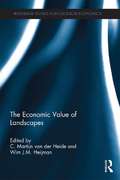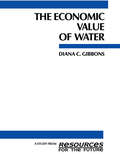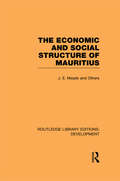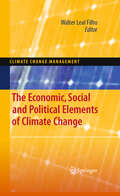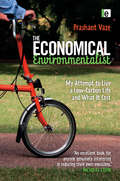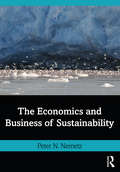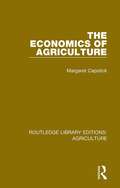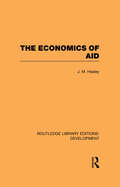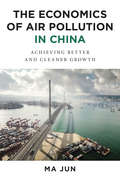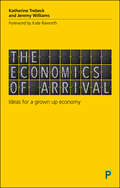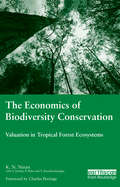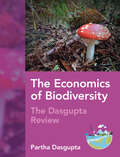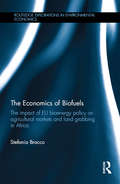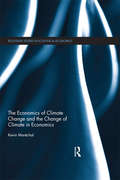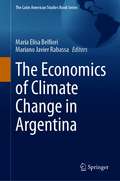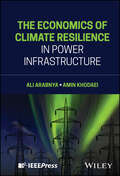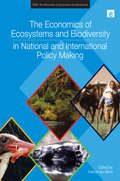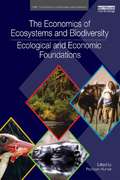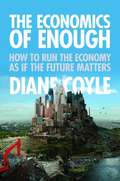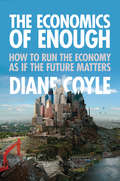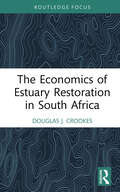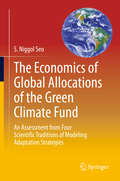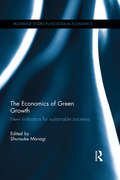- Table View
- List View
The Economic Value of Landscapes (Routledge Studies in Ecological Economics)
by C. Martijn van der Heide Wim J.M. HeijmanThis book aims to explore the avenue of landscape economics and provides the building blocks (from different scientific disciplines) for an economic analysis of landscapes. What exactly constitutes and determines the value of a landscape? It focuses on the value of landscapes in its broadest sense, thereby covering a variety of topics including stakeholder involvement in landscape design, landscape governance and landscape perceptions from different countries. Merely saying that landscapes have value or are important is not sufficient – not when resources are scarce and have alternative uses. Measuring and quantifying the economic value of changes in landscapes would help ensure that landscape management decisions are both (economically) rational and sound.
The Economic Value of Water
by Diana C. GibbonsGibbons examines the water supply problem through five case studies. The problems faced by these regions and the methods suggested to overcome them provide excellent models for the entire United States. The case studies---typically, expanding supplies---but economic efficiency principles lead to emphasizing managing the demand. In many cases, this means reducing demand by raising prices.
The Economic and Social Structure of Mauritius (Routledge Library Editions: Development)
by James E MeadeFirst published in 1961, this reissue examines the contemporary economic problems of Mauritius alongside those social problems which have a bearing on economic development. As a small and isolated economy, marked by a very rapid rate of contemporary population growth, by an extreme concentration on a single product, and by a great diversity of racial, religious and linguistic groups within the population, Mauritius is a representative microcosm of the economic problems of a large part of the developing world. The book considers the impact of a lower birth rate, emigration and economic development upon the economy of Mauritius, examining in detail the labour market, the prospects for agricultural and industrial development, the financial system and the education system.
The Economic, Social and Political Elements of Climate Change
by Walter Leal FilhoA unique feature of this book is its strong practice-oriented nature: it contains a wide range of papers dealing with the social, economic and political aspects of climate change, exemplifying the diversity of approaches to climate change management taking place all over the world, in a way never seen before. In addition, the book describes a number of projects and other initiatives happening in Africa, Asia, Europe, Latin American and the Australasian region, providing a profile of the diversity of works taking place today.
The Economical Environmentalist: My Attempt to Live a Low-Carbon Life and What it Cost
by Prashant VazeReducing your carbon emissions in an economic down-turn can be challenging, but saving the planet doesn't have to cost you more. Tough economic times need not relegate concerns for the planet to the back burner. The author is an environmental economist trying to live a low-carbon life in London. He worked for 15 years in the UK's Office of Climate Change, the Prime Minister's Strategy Unit and the Department of the Environment. So far so good. But he has kids. A family to visit in India. A hectic job. In distilling and building on his own experience of trying to live a low carbon life, he helps us navigate the choices that confront us all - families, singletons, pensioners - when making decisions about what to eat, what to buy, how to travel and how to keep warm in the era of climate change and economic turmoil. He works out the sums and lets us know which choices will make the biggest difference, and which are false savings. His book is an irreverent but seriously rigorous reference guide to low-cost, low-carbon living for everyone - in any location - in tough times. It's brimming with up-to-date information on current and future technologies, tips and ideas for every budget on how to spend the least for the biggest carbon reduction gain and insight from the experiences of people trying to live low-carbon lives.
The Economics and Business of Sustainability
by Peter N. NemetzGiven the emergence of sustainability as the defining issue of our time, it is essential for university graduates, and especially business and economics students, to have a fundamental grasp of the key issues in this emerging multidisciplinary field of study. Nemetz provides a comprehensive, detailed overview of the interlinked economic and ecological concepts central to this new discipline. Accompanying the introduction of the underlying theory is a broad array of real-world supporting data from Asia, Europe and North America. This volume also features a chapter on the threat of emerging pandemics and their significance for the achievement of a truly sustainable world. This book accentuates the value and importance of a strong sustainability approach in an age of climate change emergency. It is an ideal companion for instructors and students of sustainability in business, economics and related disciplines such as geography and political science.
The Economics of Agriculture (Routledge Library Editions: Agriculture #11)
by Margaret CapstickFirst published in 1970. The aim of this book is to provide an introduction to the special problems of agriculture in modern economies. The author writes for students of economics who have already acquired the elements of economic theory; no attempt is made, therefore, to explain simple theoretical concepts, but instead these are used in the analysis of some of the main problems of agricultural adjustment. Emphasis is placed on the position of agriculture in the economies of western Europe and of the United States. Sufficient historical background is given to explain the present use of the factors of production in agriculture and the way in which this use and policies of agricultural support vary from one country to another. Agricultural support policies are discussed with reference to their effect on consumers, producers and on rural society.
The Economics of Aid (Routledge Library Editions: Development)
by J. M. HealeyFirst published in 1971, this reissue considers the main aspects of foreign aid to developing countries in terms of economic concepts and principles. The author gives an economic definition of aid and considers the motives for giving aid and the principles on which it may be allocated. He looks at the effect on the economic growth of developing countries of both the aid given and the need to repay the debt, and the effect on trade patterns and resource allocation of tying aid to one particular project, or one source of goods. While economic analysis is only a first step in providing a basis for policy decisions on foreign aid, Dr Healey shows that many issues can be clarified by looking at them from the economists’ point of view.
The Economics of Air Pollution in China: Achieving Better and Cleaner Growth
by Jun MaSuffocating smog regularly envelops Chinese metropolises from Beijing to Shanghai, clouding the future prospect of China's growth sustainability. Air pollutants do not discriminate between the rich and the poor, the politician and the "average Joe." They put everyone's health and economic prosperity at risk, creating future costs that are difficult to calculate. Yet many people, including some in China, are concerned that addressing environmental challenges will jeopardize economic growth. In The Economics of Air Pollution in China, leading Chinese economist Ma Jun makes the case that the trade-off between growth and environment is not inevitable. In his ambitious proposal to tackle severe air pollution and drastically reduce the level of so-called PM 2.5 particles—microscopic pollutants that lodge deeply in lungs—Ma Jun argues that in targeting pollution, China has a real opportunity to undertake significant structural economic reforms that would support long-term growth. Rooted in rigorous analyses and evidence-based projections, Ma Jun's "big bang" proposal aims to mitigate pollution and facilitate a transition to a greener and more sustainable growth model.
The Economics of Air Pollution in China: Achieving Better and Cleaner Growth
by Ma JunSuffocating smog regularly envelops Chinese metropolises from Beijing to Shanghai, clouding the future prospect of China's growth sustainability. Air pollutants do not discriminate between the rich and the poor, the politician and the "average Joe." They put everyone's health and economic prosperity at risk, creating future costs that are difficult to calculate. Yet many people, including some in China, are concerned that addressing environmental challenges will jeopardize economic growth.In The Economics of Air Pollution in China, leading Chinese economist Ma Jun makes the case that the trade-off between growth and environment is not inevitable. In his ambitious proposal to tackle severe air pollution and drastically reduce the level of so-called PM 2.5 particles-microscopic pollutants that lodge deeply in lungs-Ma Jun argues that in targeting pollution, China has a real opportunity to undertake significant structural economic reforms that would support long-term growth. Rooted in rigorous analyses and evidence-based projections, Ma Jun's "big bang" proposal aims to mitigate pollution and facilitate a transition to a greener and more sustainable growth model.
The Economics of Arrival: Ideas for a Grown-Up Economy
by Jeremy Williams Katherine TrebeckWhat do we want from economic growth? What sort of a society are we aiming for? In everyday economics, there is no such thing as enough, or too much, growth. Yet in the world’s most developed countries, growth has already brought unrivalled prosperity: we have ‘arrived’. More than that, through debt, inequality, climate change and fractured politics, the fruits of growth may rot before everyone has a chance to enjoy them. It’s high time to ask where progress is taking us, and are we nearly there yet? In fact, Trebeck and Williams claim in this ground-breaking book, the challenge is now to make ourselves at home with this wealth, to ensure, in the interests of equality, that everyone is included. They explore the possibility of ‘Arrival’, urging us to move from enlarging the economy to improving it, and the benefits this would bring for all.
The Economics of Biodiversity Conservation: Valuation in Tropical Forest Ecosystems
by K.N NinanEconomic valuation of biodiversity and ecosystem services is possibly the most powerful tool for halting the loss of biodiversity while maintaining incomes and livelihoods. Yet rarely have such approaches been applied to tropical forest ?hotspots?, which house the vast majority of the planets plant and animal species. This ground-breaking work is the most comprehensive and detailed examination of the economics of environmental valuation and biodiversity conservation to date. Focusing on the Western Ghats of India, one of the top biodiversity hotspots in the world, this volume looks at a cross-section of local communities living within or near sanctuaries and reserve forests such as coffee growers, indigenous people and farmers-cum-pastoralists to assess the use and non-use values that people derive from tropical forests. It also looks at the extent of their dependence on forests for various goods and services, and examines their perceptions and attitudes towards biodiversity conservation and wildlife protection. The book concludes with an assessment of the institutional alternatives and policies for promoting biodiversity conservation through economic valuation methods. Related titles Economics for Collaborative Environmental Management (2005) 1-84407-095-6
The Economics of Biodiversity: The Dasgupta Review
by Partha DasguptaWe are part of Nature, not separate from it. We rely on Nature to provide us with food, water and shelter; regulate our climate and disease; maintain nutrient cycles and oxygen production; and provide us with spiritual fulfilment and opportunities for recreation and recuperation, which can enhance our health and well-being. Nature's constituents such as ecosystems and the biodiversity that are embodied in them are therefore assets. Yet Nature is more than an economic good: many recognise its intrinsic worth and argue that it has moral worth too. This landmark report explains the current state of play in relation to biodiversity loss and outlines a sustainable path to deal with this problem, one that will require us to change how we think, act and measure success. The report was originally commissioned and published by HM Treasury. This title is also available as Open Access on Cambridge Core.
The Economics of Biofuels: The impact of EU bioenergy policy on agricultural markets and land grabbing in Africa (Routledge Explorations in Environmental Economics)
by Stefania BraccoBiofuels are a renewable source of energy used mainly for transportation. They link together food, energy and natural resources sectors, and involve ecological, social and inequality issues. They are an emblematic example of the interactions between economic, environmental, social and political decisions and, as a recent and complex issue, require updated and detailed information to be understood. This book aims to shed light on several economic, social and environmental issues connected to biofuel production and policies. The Economics of Biofuels adopts detailed descriptions, rigorous data analysis and precise econometric methods to estimate the effects of biofuel on different socio-economic factors, avoiding complicated and sometimes ineffective models based on context-specific parameters. In particular, the book focuses on the impact of bioenergy policy on biocommodity production and trade, and on the related phenomenon of land acquisitions to grow biofuel commodities. The book’s main findings are derived by an original and unique dataset collecting information on the investors acquiring land in Africa and on the voluntary standard, certification and labelling schemes adopted by them as Corporate Social Responsibility (CSR) strategy. The analysis links together in an original way public and private initiatives to make biofuel sustainable. Therefore, this book represents an improvement in the understanding of biofuel production and policy’s sustainability. This book is of interest to those who study environmental economics, agricultural economics and sustainable development. It is also suitable for those in the renewable energy sector, with a particular focus on biofuel sustainability.
The Economics of Climate Change
by Nicholas SternThere is now clear scientific evidence that emissions from economic activity, particularly the burning of fossil fuels for energy, are causing changes to the Earth's climate. A sound understanding of the economics of climate change is needed in order to underpin an effective global response to this challenge. The Stern Review is an independent, rigourous and comprehensive analysis of the economic aspects of this crucial issue. It has been conducted by Sir Nicholas Stern, Head of the UK Government Economic Service, and a former Chief Economist of the World Bank. The Economics of Climate Change will be invaluable for all students of the economics and policy implications of climate change, and economists, scientists and policy makers involved in all aspects of climate change.
The Economics of Climate Change and the Change of Climate in Economics
by Kevin MaréchalClimate change is without question the single most important issue the world faces over the next hundred years. The most recent scientific data have led to the conclusion that the globally averaged net effect of human activities since 1750 has been one of warming and that continued greenhouse gas emissions at or above current rates would cause this process to continue to the severe detriment of our environment. This unequivocal link between climate change and human activity requires an urgent, world-wide shift towards a low carbon economy and coordinated policies and measures to manage this transition. The starting point and core idea of this book is the long-held observation that thethreat of climate change calls for a change of climate in economics. Inherent characteristics of the climate problem including complexity, irreversibility and deep uncertainty challenge core economic assumptions and mainstream economic theory appears inappropriately equipped to deal with this crucial issue. Kevin Maréchal shows how themes and approaches from evolutionary and ecological economics can be united to provide a theoretical framework that is better suited to tackle the problem.
The Economics of Climate Change in Argentina (The Latin American Studies Book Series)
by Maria Elisa Belfiori Mariano Javier RabassaIn this volume, the contributors discuss some of the most remarkable global warming effects in Argentina and examine policies that Latin American countries could follow to achieve their individual climate goals. Climate change is one of the most pressing issues today. However, after many years of climate negotiations, the world has failed to introduce a common global policy. Differences in countries' climate agendas have led to unsuccessful efforts. Countries willing to pursue a climate policy have sought alternative strategies to mitigate and adapt to global warming's consequences within their jurisdiction. In this context, Latin American countries' role in shaping the regional climate agenda is yet to be explored. The book covers some papers from the well-received "First Workshop on Environmental Economics and Energy" in Argentina. Using data from Argentina, the contributors analyze the effects of global warming on agricultural yields and the impact of extreme weather on human health. From a global perspective, the contributors also describe the interactions between a reduction in carbon emissions, carbon emissions intensity, and economic growth; the role that trade policies can play to reduce carbon emissions; and the paradoxes that arise from promoting renewable energies in the region. The contributors also address the relationship between sustainability and economic growth; the private sector's role in shaping policies and providing sustainable solutions; and the Latin American challenges for the next generation. The book will be of interest to policy-makers, academics, researchers, and professionals worldwide working in climate change impacts and policy. It will also appeal to a general audience interested in climate change economics, its consequences, and the steps that countries in Latin America can take to move forward.
The Economics of Climate Resilience in Power Infrastructure
by Amin Khodaei Ali ArabnyaFull-scope economic perspectives on planning, operations management, and maintenance of climate resilience building measures in power infrastructure The Economics of Climate Resilience in Power Infrastructure sheds light on the engineering economics of climate adaptation in electric power infrastructure by covering the relevant decision-making processes involved in managing risk and resilience in these systems. The book offers a system-level perspective along with detailed modeling of the most pressing resilience issues, while also providing detailed numerical examples on small test systems throughout the text to help readers see the outcomes of models. The book starts with an introduction to risk management and the techno-economic considerations for resilience building measures in power systems. Next, economic concepts and mechanisms for managing climate risk in power systems are introduced. Afterward, an economic model for resilience investment in these systems against climate shocks is presented. The authors then discuss an economic asset management model for long-term resilience building in critical infrastructure assets. Subsequently, an economic model for operations management during disasters is proposed, followed by a model for post-disaster restoration. Written by a pair of distinguished thought leaders, the book explores other topics such as: Microgrid applications for decentralization, along with an economic model for resilience-oriented microgrid operations A deep defense framework for climate risk management in power systems, along with other factors influencing their operational and financial resilience Essential climate risk financing mechanisms and techno-economic factors in managing risk and resilience in the face of wildfires, heat waves, and hurricanes Steps for utility and infrastructure owners to recover from climate shocks and natural disasters, for the benefit of shareholders, ratepayers, and policymakers The Economics of Climate Resilience in Power Infrastructure is an essential resource on the subject for industry practitioners, R&D engineers, infrastructure planners, and graduate students seeking to incorporate the economics of resilience with engineering solutions to streamline the success of climate adaptation measures in the power and energy industry.
The Economics of Ecosystems and Biodiversity in National and International Policy Making (TEEB - The Economics of Ecosystems and Biodiversity)
by Patrick Ten BrinkThe Economics of Ecosystems and Biodiversity (TEEB) study is a major international initiative drawing attention to local, national and global economic benefits of biodiversity, to highlight the growing costs of biodiversity loss and ecosystem degradation, the benefits of investing in natural capital, and to draw together expertise from the fields of science, economics and policy to enable practical actions. Drawing on a team of more than one hundred authors and reviewers, this book demonstrates the value of ecosystems and biodiversity to the economy, society and individuals. It underlines the urgency of strategic policy making and action at national and international levels, and presents a rich evidence base of policies and instruments in use around the world and a wide range of innovative solutions. It highlights the need for new public policy to reflect the appreciation that public goods and social benefits are often overlooked and that we need a transition to decision making which integrates the many values of nature across policy sectors. It explores the range of instruments to reward those offering ecosystem service benefits, such as water provision and climate regulation. It looks at fiscal and regulatory instruments to reduce the incentives of those running down our natural capital, and at reforming subsidies such that they respond to current and future priorities. The authors also consider two major areas of investment in natural capital - protected areas and investment in restoration. Overall the book underlines the needs and ways to transform our approach to natural capital, and demonstrates how we can practically take into account the value of ecosystems and biodiversity in policy decisions - at national and international levels - to promote the protection of our environment and contribute to a sustainable economy and to the wellbeing of societies.
The Economics of Ecosystems and Biodiversity: Ecological And Economic Foundations (TEEB - The Economics of Ecosystems and Biodiversity)
by Pushpam KumarHuman well-being relies critically on ecosystem services provided by nature. Examples include water and air quality regulation, nutrient cycling and decomposition, plant pollination and flood control, all of which are dependent on biodiversity. They are predominantly public goods with limited or no markets and do not command any price in the conventional economic system, so their loss is often not detected and continues unaddressed and unabated. This in turn not only impacts human well-being, but also seriously undermines the sustainability of the economic system. It is against this background that TEEB: The Economics of Ecosystems and Biodiversity project was set up in 2007 and led by the United Nations Environment Programme to provide a comprehensive global assessment of economic aspects of these issues. This book, written by a team of international experts, represents the scientific state of the art, providing a comprehensive assessment of the fundamental ecological and economic principles of measuring and valuing ecosystem services and biodiversity, and showing how these can be mainstreamed into public policies. This volume and subsequent TEEB outputs will provide the authoritative knowledge and guidance to drive forward the biodiversity conservation agenda for the next decade.
The Economics of Enough: How to Run the Economy As If the Future Matters
by Diane CoyleThe world's leading economies are facing not just one but many crises. The financial meltdown may not be over, climate change threatens major global disruption, economic inequality has reached extremes not seen for a century, and government and business are widely distrusted. At the same time, many people regret the consumerism and social corrosion of modern life. What these crises have in common, Diane Coyle argues, is a reckless disregard for the future--especially in the way the economy is run. How can we achieve the financial growth we need today without sacrificing a decent future for our children, our societies, and our planet? How can we realize what Coyle calls "the economics of enough"? Running the economy for tomorrow as well as today will require a wide range of policy changes. The top priority must be ensuring that we get a true picture of long-term economic prospects, with the development of official statistics on national wealth in its broadest sense, including natural and human resources. Saving and investment will need to be encouraged over current consumption. Above all, governments will need to engage citizens in a process of debate about the difficult choices that lie ahead and rebuild a shared commitment to the future of our societies. Creating a sustainable economy--having enough to be happy without cheating the future--won't be easy. But The Economics of Enough starts a profoundly important conversation about how we can begin--and the first steps we need to take.
The Economics of Enough: How to Run the Economy as If the Future Matters
by Diane CoyleThe world's leading economies are facing not just one but many crises. The financial meltdown may not be over, climate change threatens major global disruption, economic inequality has reached extremes not seen for a century, and government and business are widely distrusted. At the same time, many people regret the consumerism and social corrosion of modern life. What these crises have in common, Diane Coyle argues, is a reckless disregard for the future--especially in the way the economy is run. How can we achieve the financial growth we need today without sacrificing a decent future for our children, our societies, and our planet? How can we realize what Coyle calls "the Economics of Enough"? Running the economy for tomorrow as well as today will require a wide range of policy changes. The top priority must be ensuring that we get a true picture of long-term economic prospects, with the development of official statistics on national wealth in its broadest sense, including natural and human resources. Saving and investment will need to be encouraged over current consumption. Above all, governments will need to engage citizens in a process of debate about the difficult choices that lie ahead and rebuild a shared commitment to the future of our societies. Creating a sustainable economy--having enough to be happy without cheating the future--won't be easy. But The Economics of Enough starts a profoundly important conversation about how we can begin--and the first steps we need to take.
The Economics of Estuary Restoration in South Africa (Routledge Focus on Environment and Sustainability)
by Douglas J. CrookesThis book examines the economic costs and benefits of the ecological restoration of estuaries, utilizing case studies from South Africa. Estuaries are important ecosystems from both an ecological and human perspective. Yet, in many parts of the world they are often degraded environments, facing threats from climate change, invasive species, fire and wastewater pollution. While the environmental benefits of restoring degraded environments are well discussed, this book specifically examines the economic benefits of doing so. It applies a cost-benefit analysis, which focuses on a range of key ecosystem services, including human health, fishing value, recreational value and property value. The book utlizes three detailed studies of the Swartkops estuary, the Great Brak estuary and the Knysna estuary in South Africa, but also draws out lessons that can be applied to coastal environments across the world. Overall, this book demonstrates that ecological restoration does pay and that the value of additional ecosystem services gained through restoration far exceeds the costs associated with this restoration process. This book will be of great interest to students and scholars of environmental management and restoration, ecological economics, ecosystem services and environmental conservation.
The Economics of Global Allocations of the Green Climate Fund: An Assessment from Four Scientific Traditions of Modeling Adaptation Strategies
by S. Niggol SeoThis book provides an incisive and economic assessment of the global warming adaptation policy and programs carved out by the United Nations Framework Convention on Climate Change, the Green Climate Fund (GCF), by relying on the four scientific traditions that have been advanced on the economics of adaptation to climate change in agricultural and natural resource enterprises. Substantially expanding and refocusing on the book Micro-behavioral Economics of Global Warming: Modeling Adaptation Strategies in Agricultural and Natural Resource Enterprises published by Springer in 2015, this book elucidates the theories and summarizes the empirical results and predictions from the four traditions of adaptation modelling: a microbehavioral economic model of adaptation, an agronomic-economic modelling, a statistical model of yield/productivity changes, and an ecosystem model of climate change impacts. The four modeling traditions are freshly analyzed and applied to the assessments of the 93+ GCF-funded projects and programs through the end of 2018.
The Economics of Green Growth: New indicators for sustainable societies (Routledge Studies in Ecological Economics)
by Shunsuke ManagiThe Economics of Green Growth investigates the possibility of creating an integrated indicator covering three pillars of sustainable development: economy, society and the environment. The excessive pursuit of economic efficiency has resulted in severe environmental problems such as climate change and biodiversity loss, and societal human issues such as inequality and disparity. The book aims to change the direction of economic growth towards one which is more sustainable. It explores beyond the conventional indicator, the GDP that measures economic growth and human well-being. It also introduces new indicators relevant to sustainable development and a green economy and discusses the key issues for these indicators.
